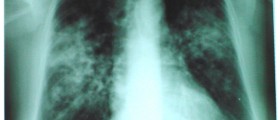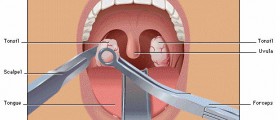 What Is the Epiglottis?
What Is the Epiglottis?

The epiglottis is a "flap" in the throat that consists of elastic cartilage attached to the basis of the tongue. This leaf-shaped organ is situated right next to the entrance of the glottis, the part of the throat where the vocal cords can be found.
The epiglottis is pointed upwards during breathing, which allows normal passage of air. During the act of swallowing, the epiglottis descends closing the glottis and preventing food and liquid from entering the trachea. In plain English, the epiglottis helps ensure that the food and liquids you consume don't end up in your lungs or windpipe, where they would cause serious problems.
The epiglottis is commonly swollen if inflamed, and this inflammation of epiglottis is called epiglottitis. Apart from swelling, additional symptoms of epiglottitis include redness of the epiglottis, abnormal breathing sounds, fever and chills, excessive presence of saliva, cyanosis, hoarseness and patients commonly complain about pain.
A swollen epiglottis may affect both children and adults. The infection can be caused by the viruses or bacteria, and even physical injury can lead to this inflammation in some cases. In severe situations, epiglottitis can become life-threatening.
Causes of a Swollen Epiglottis
A swollen, inflamed, epiglottis can be caused by many different factors. The inflammation does not have to only affect epiglottis, either. The surrounding tissues can become inflamed as well.
Infection of any kind is the typical and most common cause of epiglottitis. Numerous infective agents can be engaged in the process, including bacteria (Streptococcus pneumoniae), viruses (Varicella zoster, Hemophilus influenzae) and fungi (Candida albicans). In the past, Hib was often to blame, but with routine vaccination this has decreased as a cause of epiglottitis.
Apart from infections, physical trauma may be another cause of a swollen epiglottis. A direct blow to the throat, scald burns to the neck and face, and especially burns caused by drinking very hot fluids lead to epiglottitis and consequent swelling of the epiglottis. The most severe damage which is followed by swelling of the epiglottis is inhalation of toxic chemicals or other irritants. And finally, drug addicts who smoke heroin or crack are more susceptible to swelling of the epiglottis.
How IS Epiglottitis Diagnosed and What Is the Treatment for a Swollen Epiglottis?
Making a diagnosis of epiglottitis starts with a physical examination of the patients. Apart from obvious signs of a swollen epiglottis, the doctor must examine the oral cavity, pharynx, and larynx. This examination gives a perfect insight into any swelling of the epiglottis and surrounding tissues.
In case of infection, the doctor will take samples from the epiglottis with swabs. These samples are necessary for the identification of the infective agent that caused the infection. Furthermore, blood tests are performed and in certain cases doctors perform an X-ray and nasopharyngoscopy.
The treatment for a swollen epiglottis depends on the underlying cause of the epiglottitis. In mild to moderate infections, patients are given the proper medications for the cause, such as antibiotics, antiviral drugs or antifungal medications which will eradicate the infective agent. Sometimes patients are given bronchodilatators (inhalers). They may reduce swelling and sticky mucus that blocks the trachea.
If the swelling seen in a case of epiglottitis is serious and interferes with breathing, the condition requires urgent medical help. Patients are administered oxygen, and they may be intubated and sometimes even put on a ventilator. In extreme cases, a tracheotomy is performed.
- www.nhs.uk/conditions/epiglottitis/
- medlineplus.gov/ency/article/000605.htm
- Photo courtesy of Dimitrios Malamos by Wikimedia Commons: bs.wikipedia.org/wiki/Datoteka:High_rising_epiglottis.JPG
















Your thoughts on this
Loading...